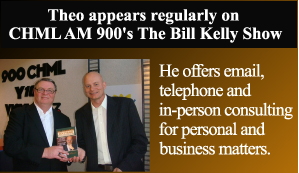Here’s a formula that I just came up with for those of you accustomed to reading “step” programs and slick formulas: Integrity (“Walking the talk”) encourages trust, trust builds respect, respect activates commitment, commitment feeds dedication, dedication strengthens work ethic, work ethic fuels productivity… I’ll stop now or the circle would get too big before I tie it all back to integrity. I might map it out in flashy colours and copyright it someday, but you get the picture.
The thing is, I could have continued to attach all kinds of values to that formula, because once you come down to it, values do tend to be related. Just ask anyone to pick 5 core values from a list of 50, and you’ll see what I mean. You’ll hear people talk about how respect is part of trust and trust is part of commitment, and so on. And it all makes intuitive sense, so if I had said passion nourishes creativity, and creativity fuels productivity you would very possibly have sagely nodded your head. That’s one reason why there are so many marketed management formulas out there. You can say the same thing in many different ways.
What it comes down to is this: People are drawn to values and they like to feel valued. They like to feel good about themselves, and they’d prefer to work in a place where they feel good than a place where they don’t. And by now, we have a pretty good idea of what makes people feel good. As Maslow noted a fairly long time ago, people have a series of needs (Physiological, Safety, Love/Belonging, Esteem, and Self-actualization). If you want to mange people effectively, it would do you good to value the meeting of those needs.
If you on the other hand don’t pay people enough, provide inconsistent feedback, disregard physical safety and harassment issues, alienate your staff by treating them as nameless objects, display favoritism, make arbitrary decisions without consulting the people who will be most impacted by these decisions, fail to acknowledge success and focus more on criticism, and do not provide opportunity for people to grow, you should not be too surprised at seeing the departing backsides of your best and brightest. What’s more, you will likely be saddled with sycophants (“suck-ups”) and the less inspired staff who stay out of fear or lack of ambition, and who content themselves with the spiritless mantra, “It’s just a job”. Plus, of course, you’ll have the additional expenses of sick leaves, absenteeism, theft (of time and material), harassments and legal issues that research has consistently shown as associated with organizations lacking in clearly stated, collaboratively formed, and followed values that take into account the needs of employees.
Values are what your organization stands for, and by inference, if created collaboratively, what your employees stand for-and by further inference it means that employees will stand for the organization. Values are what define your organization and all of its associated behaviours and interactions with every stakeholder, be it management, staff, suppliers, clients, or the community. Think of a stated value as being a vow, and you will begin to understand how significant it is for an organization to not only identify its values, but to live them.
Here is where integrity comes in; few things will create more disharmony, disenchantment, demoralization, and cynicism than an organization or person that professes to hold certain values and doesn’t follow through with them. I’ve been part of an organization that professed to be strength based but management took every opportunity to highlight staff weaknesses. The impact of that on morale and trust and all those other values was dramatic. It would have been better if that organization had clearly stated a lack of values rather than having dragged staff through the appearance of care and collaboration on a values search, only to pay lip service to the outcome.
The truth is, you can’t escape having values, and the values expressed through behavours are always experienced as more real than those via words. An organization that states collaboration as a value but does not consult with staff about significant decisions is actually living out a value of expediency over process. An organization that purports to value respect but allows for gossiping is actually living out a negative competitive value. The loss of trust, commitment, passion, dedication, buy in, respect, etc cost of this double talk is hugely significant. Employees begin to look out for “number one” as they realize that they can’t count on leadership to care for their needs, or they do the instinctive tribal thing, and gather together in cliques for protection. In any case, there is the loss of a spiritual, (yes, “spiritual”) connection with the organization. In fact, I will even go so far to say that the organization itself will have lost its soul. For sure it will have lost its direction and connection to the people who make up and drive it.
Integrity does indeed work. It pays off in tangible staff buy in and production and it shines in the organization’s everyday interaction with all its stakeholders. It’s the value that holds everyone accountable to shared values and reasons for being. It’s what underlies never devalued wishes of “practice what you preach”, and “walk the talk” that we all hold true to from childhood years. Lose integrity at the risk of losing everything else that holds your organization together and makes it a vital living thing.
Theo Selles, M.Sc.
647-686-0116












